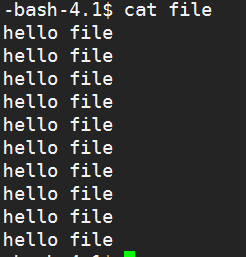1.open()函数
头文件:
#include <fcntl.h>//在centos6.0中只要此头文件就可以
#include <sys/types.h>
#incldue <sys/stat.h>
功能:打开和创建文件(建立一个文件描述符,其他的函数可以通过文 件描述符对指定文件进行读取与写入的操作。)
原型
int open(const char*pathname,int flags);
int open(const char*pathname,int flags,mode_t mode);
参数说明:
1.pathname
要打开或创建的目标文件
2.flags
打开文件时,可以传入多个参数选项,用下面的
一个或者多个常量进行“或”运算,构成falgs
参数:
O_RDONLY: 只读打开
O_WRONLY: 只写打开
O_RDWR: 读,写打开
这三个常量,必须制定一个且只能指定一个
O_CREAT: 若文件不存在,则创建它,需要使
用mode选项。来指明新文件的访问权限
O_APPEND: 追加写,如果文件已经有内容,这次打开文件所
写的数据附加到文件的末尾而不覆盖原来的内容
ps:open函数具体使用那个,和具体应用场景相关,如目标文件存在,使用两个参数的open,如果目标文件不存在,需要open创建,则第三个参数表示创建文件的默认权限
返回值
成功:新打开的文件描述符
失败:-1
open返回的文件描述符一定是最小的而且没有被使用的
fopen与open的区别
以可写的方式fopen一个文件时,如果文件不存在则会自动创建,而open一个文件时必须明确O_CREAT才会创建文件,否则文件不存在就出错返回
2.close()函数
头文件:#include<unistd.h>
功能:关闭一个已经打开的文件
原型
int close(int fd)
参数说明:
fd:是需要关闭的文件描述符
返回值
成功:返回0;
失败:返回-1,并设置errno
打开的文件描述符一定要记得关闭,否则资源会被大量的占用,导致内存不够
3.open打开存在的文件
示例1:
#include <stdio.h>
#include <string.h>
#include <fcntl.h>
#include <unistd.h>
#include <stdlib.h>
int main()
{
int fd=open("myfile.txt",O_WRONLY);//需要准备myfile.txt文件
if(fd<0)
{
perror("open");
exit(1);
}
const char*msg="hello open\n";
int count = 6;
while(count--)
{
write(fd,msg,strlen(msg));
}
close(fd);
return 0;
}
运行结果:

示例2:
#include <stdio.h>
#include <stdlib.h>
#include <string.h>
#include <fcntl.h>
#include <unistd.h>
int main()
{
int fd=open("myfile.txt",O_RDWR);
if(fd<0)
{
perror("open");
exit(1);
}
const char*msg="hello hahaha\n";
int count= 10;
while(count--)
{
write(fd,msg,strlen(msg));
}
char buf[1024]= {0};
int num=10;
while(num--)
{
read(fd,buf,strlen(msg));
}
close(fd);
return 0;
}
运行结果:

3.open打开不存在的文件
示例1:
#include <stdio.h>
#include <stdlib.h>
#include <unistd.h>
#include <string.h>
#include <fcntl.h>
int main()
{
int fd=open("file.txt",O_WRONLY|O_CREAT,0644); //file文件不存在,所以在书写第二个参数时,记得把O_CREAT加上, //如果不加O_CREAT的话,程序就会报此文件不存在
if(fd<0)
{
perror("open");
exit(1);
}
const char*msg="hello file\n";
int count=10;
while(count--)
{
write(fd,msg,strlen(msg));
}
close(fd);
return 0;
}
运行结果:

参考资料:
https://blog.csdn.net/dangzhangjing97/article/details/79631173





















 1063
1063











 被折叠的 条评论
为什么被折叠?
被折叠的 条评论
为什么被折叠?








